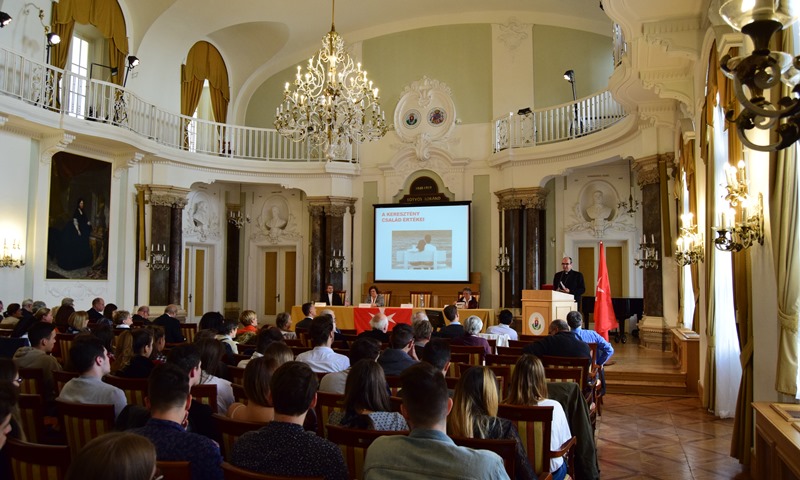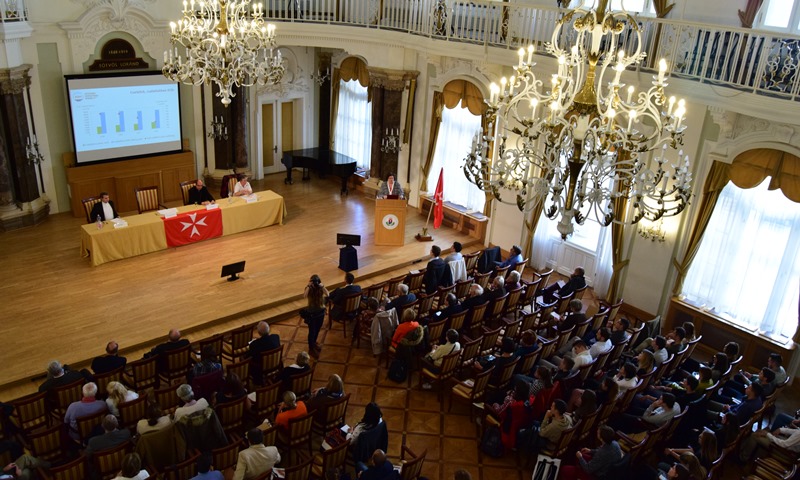Hírek

Ketten Hármasban: konferencia a családról
Budapest, 2018 szeptember 27. „A keresztény házasság, család – időt álló értékek” címmel szervezett konferenciát a Magyar Máltai Lovagok Szövetsége szeptember 27-én délután.
„Ketten hármasban” - idézte bevezető előadásában dr. Székely János megyés püspök Gyökössy Endre református lelkészt, a kifejezés tömören azt fejezi ki: minden jó házasságban jelen van az Isten. Bibliai idézetekkel vezette le: az ember akkor lesz boldog, ha megtanul szeretni. A házasság pedig nem csak futó érzelem, nem csak egyezség, hogy a gyerekeket közösen felnevelik, hanem a házasságban két ember – eggyé lesz. A házasság nem bekorlátoz, hanem az önátadás teljessége. S hogyan lehetnek a gyerekeink boldogok? Ha mi magunk is azok vagyunk. Azaz: egy édesanya úgy szeretheti legjobban a gyerekét, ha a férjét szereti. És természetesen viszont. Végül néhány pontban összefoglalta, milyen intézkedésekre lenne szükség, hogy a népességfogyást le lehessen lassítani, és később meg lehessen állítani. A legfontosabbak: a jogszabályok további széles körű felülvizsgálata: segítik-e a házasságot, a gyerekvállalást. Jegyesoktatás mindenkinek. Az édesanyák segítése. Fiatal házasoknak „keltető lakások”. Családbarát, értékközpontú média. Intézkedések az abortuszok számának csökkentésére, egyebek közt a magzat fotójának megmutatásával a döntés előtt, és életpárti tanácsadással. A legnagyobb családokra és a 24 százaléknyi nehéz anyagi körülmények között élő családokra fordított különleges figyelem.
Dr. Vukovich Gabriella, a Központi Statisztikai Hivatal elnöke grafikonokkal, táblázatokkal mutatta be a családok mai helyzetét és a tendenciákat. Jelentős előrelépés, hogy az úgynevezett termékenységi mutató (a szülőképes korú nők átlagos gyermekszáma) a 2011-es 1.23-ról mostanra 1.5-re nőtt. Ám ez alig jelent több gyereket, hiszen a szülőképes korú nők száma csökkent. A magyar népesség tehát tovább fogy. Jó jel, hogy a házasságkötések száma az utóbbi években jelentősen nőtt: a 2011-es harminchatezerről 2016-ra ötvenkétezerre. Jellemző adat viszont, hogy a gyerekek több mint a fele ma már nem házasságban születik. Ezért demográfiai szempontból fontos a nem házasságban élők fokozott támogatása is, annak ellenére, hogy nem ez az ideális megoldás. Ugyancsak támogatni kell a fokozottan kiszolgáltatott egyszülős családokat is. Az úgynevezett háromgenerációs családok száma (ahol a nagyszülők is a családdal élnek) 2001 és 2011 között 270 ezerről 180 ezerre csökkent idehaza, a nagyszülős családokban élő gyerekek száma feleződött. Mondani se kell talán, milyen kölcsönös előnyök mennek így veszendőbe. Érdekes volt a gyermekszám és a vallásosság összefüggése: egy adatsorból kiderült, a keresztény felekezetekhez tartozó családokban átlagosan 20 százalékkal több gyermek születik, mint a vallási felekezethez nem tartozóknál.
Dr. Papp Miklós görögkatolikus lelkész előadásában is a krisztusi szeretet, a feltétlen szeretet: az agapé szerepét hangsúlyozta a házasságban. Erósz – a vágy, Philia – a baráti szeretet, a társként való elfogadás, és az Agapé – amelyben ketten haladnak az Isten felé: egyaránt fontos a kapcsolatban. Szomorúan látja, hogy nagyon gyakran a fiúk nem mernek lépni, nem mernek dönteni, hogy házasságra lépjenek-e a barátnőjükkel, és ebben gyakran a szüleik asszisztálnak nekik: korai még… Ezzel a lányok éveket vesztenek, töltenek meddőségben. Lépni kell! Ugyancsak hiányolja a mai családokban az apa férfias szeretetét, ami döntésre kényszeríti a gyereket. Az anyai szeretet gyöngéd, megengedő – ám hiba, ha mindkét szülő ilyen, és hiányzik a követelő, kemény szeretet. Szükség van családi spiritualitásra – ami nem altat, hanem dinamizál.
Dr. Seidl Ágoston máltai lovag a házasság lépcsőfokairól beszélt. Hogy mennyire fontos lenne az „előszoba”, a ma talán divatjamúlt jegyesség, ahol a fiatalok összecsiszolódhatnak, kiderülhet, van-e valóban közös értékrendjük. A már gyermekes családokban a közös teherviselés, és az egymásra fordított minőségi idő fontossága. És végül, a gyermekek kirepülése után, a házastársak újra szorosabbá váló kapcsolatának megélése.
Dr. Dabóczi Kálmán, a BKK vezérigazgatója saját hétgyermekes családjának példáján mutatta be a család-karrier-hivatás kényes egyensúlyának megteremtését. Fényképekkel és konkrét példákkal mutatta be: a nagycsalád működik. De nem magától! Ha a házaspár szereti egymást, ez a legtöbb, amit a gyerekeiknek adhatnak. Fontos, hogy a gyerekeket be kell vonni mindenbe – a közös munkába, a közös élményekbe, sikerekbe, de adott esetben a kudarcokat is meg kell élniük. Ugyanígy, a családi misztériumokon keresztül be kell vezetni őket a Jóisten világába is.
Dr. Thorday Attila plébános, teológiai tanár a házasság megújulásáért, támogatásáért alakult egyházi mozgalmakról, közösségekről beszélt. Ezeket egy-egy karizmatikus személy elindítja, és lassan strukturált közösségi szervezetekké válnak. Ilyenek egyebek közt a Magyar Schönstatt Család, a Családok Jézusban, a Mécs Családközösségek, a Chemin Neuf, a Házas Hétvége, az Antiochia. Az egyház ezeken a közösségeken keresztül is sokat tesz a családokért.
A Magyar Máltai Lovagok Szövetsége Családkonferenciája fiatalok kerekasztal beszélgetésével zárult. Érdekes volt hallani, hogy a teológiai alapvetések, az izgalmas gondolatok hogyan működnek a gyakorlatban, az ő mindennapi életükben.
A konferencia egyik alap mondatát Dr. Thorday Attilától hallottuk: A házasság a legnehezebb szerzet. Mert minden nap újra kell kezdeni...
A konferencia programja ide kattintva olvasható. Lásd továbbá:
- Magyar Kurír részletes beszámolója - ide kattintani
- Teljes hanganyag: első rész és második rész

